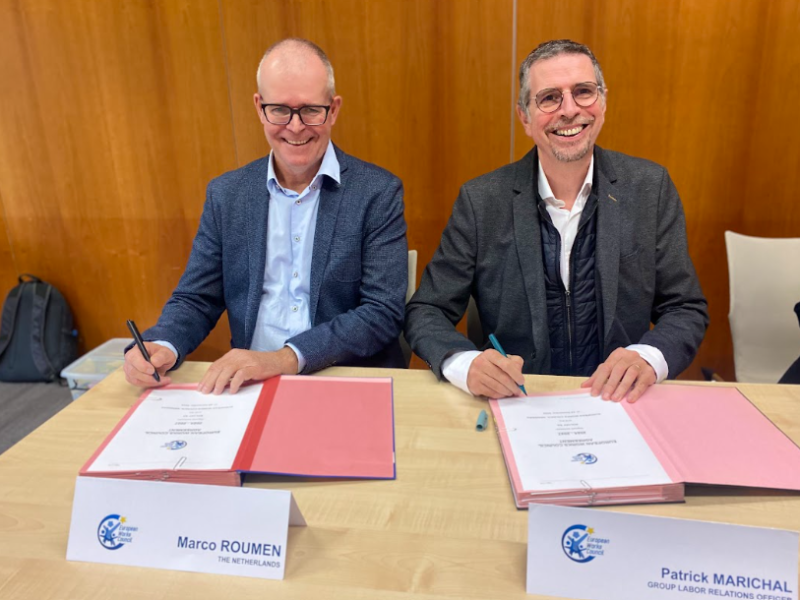European Works Council (EWC)
Employee representation becomes law
On 22 September 1994, the European Commission introduced Council Directive 94/45/EC. The directive required companies in Europe with a certain number of employees to establish works councils comprising of employee representatives who were elected by the employees. For workers, the legislation meant that they had a legal right to have a say in decisions that affect their working conditions.

The formation of the European Works Council and first years
With the support of the European Mine, Chemical, and Energy Workers Federation (EMCEF), a specially established negotiating body agreed on a contract with Solvay’s leadership regarding employee representation. On 5 October 1995, the European Works Council (EWC) was founded, made up largely of trade union veterans and comprising all European countries in which Solvay operated.
The contract included provisions to establish the Select Committee of the European Works Council and appointment of three members, which was expanded to four in 2009. Today, this structure is still in place. Amongst other duties, the Select Committee organizes and coordinates plenary assemblies between the EWC and senior management, of which the first plenary was held in the Eurovillage Hotel in Brussels.
The early years of the EWC largely focused on establishing trust and communication between both bodies, and asserting the workers’ right to be informed and consulted.
Establishing a strong social dialogue
Soon after the formation of the EWC, the council reached several key consensus points that set a strong tone for its future work.
Some of those consensus points included the agreement that workers in Portugal no longer had to pay for their own safety equipment, and internet and email became accessible for all. At the EWC’s first joint seminar at Limelette Palace, several national groups also joined forces to form a union.
A real breakthrough in the collaboration between senior management and the EWC came in the 1996 following a fire at Düsseldorf airport, which sparked a discussion on banning PVC, then one of Solvay’s main business pillars. The EWC and Solvay leadership started a working group on Chlorine/PVC marking the birth of what is now known as the enlarged select committee. This working group challenged the request, and cemented the mutual trust and understanding between the two bodies that continues today.
Since then, four joint charters have been agreed, one of which focuses on sustainable development and is part of our global Solvay One Planet commitment.


Signature of new agreement EWC - Solvay
Solvay’s European Works Council (EWC) Secretary, Marco Roumen, Solvay’s Head of Labor Relations, Patrick Marichal, have signed a new agreement for the EWC, so to ensure continuity of social dialogue from the spin-off.”
The new agreement establishes a framework for the representation of Solvay employees in Europe.
The agreement includes the following key points:
- The creation of an EWC Select Committee, composed of representatives from the Netherlands, Germany and Spain. The Select Committee will be responsible for carrying out the day-to-day work of the EWC and taking decisions on its agenda.
- The creation of an EWC Extended Committee ( the Select Commitee and three additional members from France, Bulgaria and Germany ), which will focus on specific issues such as health and safety, environment or working conditions.
The new agreement is an important step towards ensuring Solvay’s employee representation in Europe. It reflects the company’s commitment to employee participation and to creating a fair and equitable workplace.
In particular, the agreement ensures that:
- Employees in all countries covered have a voice company decision-making.
- The interests of employees from all countries are covered.
- Employees in all countries covered have access to information and training on the EWC.
The new agreement is a testimonial to the collaboration between the EWC and Solvay. It is a commitment to creating a better workplace for all Solvay employees.

Solvay: a new chapter after the spin-off of Syensqo
On 9 December 2023, Solvay successfully completed the spin-off of its specialty chemicals activities to Syensqo.
The spin-off of the specialties activities to Syensqo is intended to allow both companies to focus on their respective markets and strategies.
Solvay is now a world leader in commodity chemicals, it will focus on products that are essential for the production of a wide range of goods and services. It comprises the : Soda Ash and Derivatives, Silica and Special Chem, Coatis and Peroxides GBU’s.
The role of the EWC
Solvay’s European Works Council (EWC) made the best efforts to ensure the best possible conditions for the employees of both companies, including the safeguarding of jobs, conditions of employment, job security conditions and career development. To support this the EWC and the company signed the so called Memorandum of Understanding in May 202.
For the employees of both companies, the spin-off could lead to changes in their jobs. Some employees may have to relocate or take on new responsibilities. However, the EWC has been working to ensure that employees have the necessary opportunities to adapt to these changes, including the training necessary for their professional development.
In this respect, the EWC has achieved important progress, such as the guarantee that all Syensqo workers will keep their acquired rights.
In addition we signed with the management the Transition Agreement in December 2022, ensuring that both new companies have a fully functioning EWC at spin-off date.
The new EWC agreement provides employees of both companies with the security and stability they need to progress.
In the short term, the objective of the EWC is to support the employees of both companies in the process of adapting to the new situation. In the medium term, the EWC will work to ensure that Solvay remains competitive and continues to provide quality employment for their workers. In the long term, the EWC expects the Spin-off of Solvay will be a success for the company and the employees.
